Hyundai i20 VS Toyota Proace City – Specs, Efficiency & Price Comparison
Which model is the better choice – the Hyundai i20 or the Toyota Proace City? We compare performance (100 HP vs 136 HP), boot capacity (352 L vs 912 L), efficiency (5.20 L vs 18.10 kWh5.30 L), and of course, the price (17400 £ vs 20800 £).
Find out now which car fits your needs better!
The Hyundai i20 (Hatchback) is powered by a Petrol MHEV or Petrol engine and comes with a Automatic or Manuel transmission. In comparison, the Toyota Proace City (High Roof Estate) features a Petrol, Diesel or Electric engine and a Manuel or Automatic gearbox.
When it comes to boot capacity, the Hyundai i20 offers 352 L, while the Toyota Proace City provides 912 L – depending on what matters most to you. If you’re looking for more power, you’ll need to decide whether the 100 HP of the Hyundai i20 or the 136 HP of the Toyota Proace City suits your needs better.
There are also differences in efficiency: 5.20 L vs 18.10 kWh5.30 L. In terms of price, the Hyundai i20 starts at 17400 £, while the Toyota Proace City is available from 20800 £.
Compare all the key specs now and find out which model fits your lifestyle best!
Hyundai i20
The Hyundai i20 impresses with its sleek design and modern aesthetics, making it a stylish choice in the compact car segment. Its interior is thoughtfully designed, offering comfort and advanced technology for a pleasurable driving experience. The vehicle also stands out with its efficient performance and agile handling, making city driving a breeze.
details @ hyundai.news
@ hyundai.news
 @ hyundai.news
@ hyundai.news
 @ hyundai.news
@ hyundai.news
 @ hyundai.news
@ hyundai.news
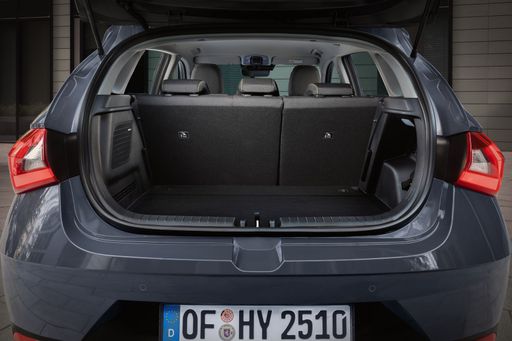 @ hyundai.news
@ hyundai.news
Toyota Proace City
The Toyota Proace City High Roof Combi is designed to seamlessly blend practicality with comfort, making it an ideal choice for families and businesses alike. Its versatile interior allows for flexible seating and cargo arrangements, catering to a variety of transport needs. Equipped with modern technology and advanced safety features, this vehicle ensures a reliable and secure driving experience.
details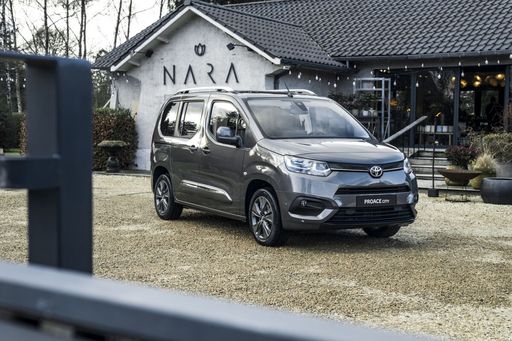 @ Toyota Deutschland
@ Toyota Deutschland
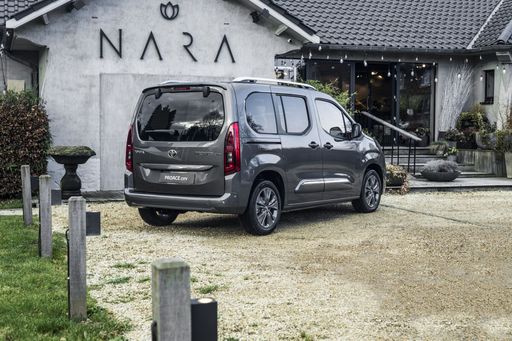 @ Toyota Deutschland
@ Toyota Deutschland
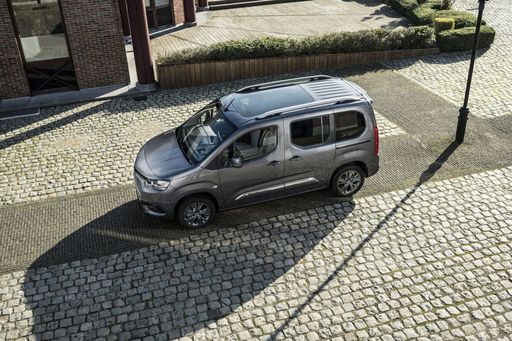 @ Toyota Deutschland
@ Toyota Deutschland
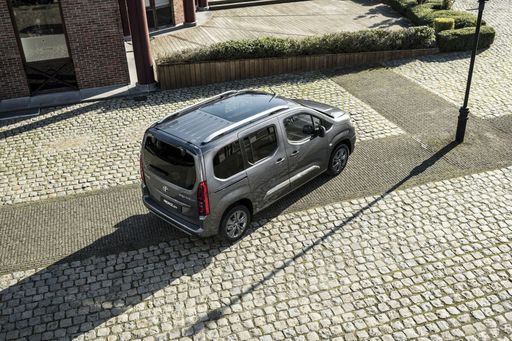 @ Toyota Deutschland
@ Toyota Deutschland
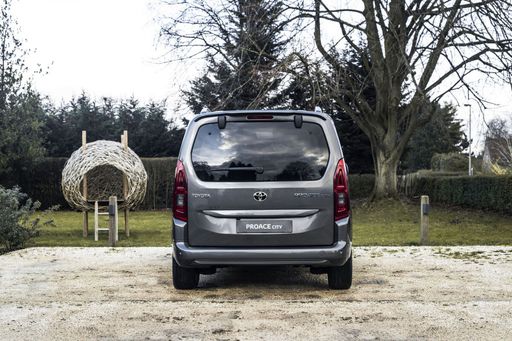 @ Toyota Deutschland
@ Toyota Deutschland
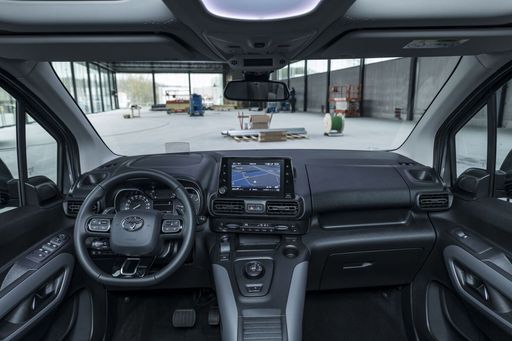 @ Toyota Deutschland
@ Toyota Deutschland

|

|
|
|
|
Costs and Consumption |
|
|---|---|
|
Price
17400 - 24000 £
|
Price
20800 - 42100 £
|
|
Consumption L/100km
5.2 - 5.3 L
|
Consumption L/100km
5.3 - 6.3 L
|
|
Consumption kWh/100km
-
|
Consumption kWh/100km
18.10 kWh
|
|
Electric Range
-
|
Electric Range
343 km
|
|
Battery Capacity
-
|
Battery Capacity
-
|
|
co2
119 - 121 g/km
|
co2
0 - 146 g/km
|
|
Fuel tank capacity
40 L
|
Fuel tank capacity
50 - 61 L
|
Dimensions and Body |
|
|---|---|
|
Body Type
Hatchback
|
Body Type
High Roof Estate
|
|
Seats
5
|
Seats
5 - 7
|
|
Doors
5
|
Doors
4 - 5
|
|
Curb weight
1088 - 1190 kg
|
Curb weight
1366 - 1664 kg
|
|
Trunk capacity
352 L
|
Trunk capacity
322 - 912 L
|
|
Length
4065 - 4075 mm
|
Length
4401 - 4751 mm
|
|
Width
1775 mm
|
Width
1848 mm
|
|
Height
1450 - 1455 mm
|
Height
1812 - 1818 mm
|
|
Payload
450 - 472 kg
|
Payload
525 - 869 kg
|
Engine and Performance |
|
|---|---|
|
Engine Type
Petrol MHEV, Petrol
|
Engine Type
Petrol, Diesel, Electric
|
|
Transmission
Automatic, Manuel
|
Transmission
Manuel, Automatic
|
|
Transmission Detail
Automat. Schaltgetriebe (Doppelkupplung), Schaltgetriebe
|
Transmission Detail
Schaltgetriebe, Automatikgetriebe
|
|
Drive Type
Front-Wheel Drive
|
Drive Type
Front-Wheel Drive
|
|
Power HP
79 - 100 HP
|
Power HP
102 - 136 HP
|
|
Acceleration 0-100km/h
11.1 - 13.7 s
|
Acceleration 0-100km/h
11.5 - 13.2 s
|
|
Max Speed
166 - 183 km/h
|
Max Speed
135 - 186 km/h
|
|
Torque
113 - 200 Nm
|
Torque
205 - 300 Nm
|
|
Number of Cylinders
3 - 4
|
Number of Cylinders
3 - 4
|
|
Power kW
58 - 74 kW
|
Power kW
75 - 100 kW
|
|
Engine capacity
998 - 1197 cm3
|
Engine capacity
1199 - 1499 cm3
|
General |
|
|---|---|
|
Model Year
2024
|
Model Year
2024 - 2025
|
|
CO2 Efficiency Class
D
|
CO2 Efficiency Class
E, A
|
|
Brand
Hyundai
|
Brand
Toyota
|
Hyundai i20
Introducing the Hyundai i20: A Blend of Style and Efficiency
The Hyundai i20 has been a favourite in the subcompact car segment, loved for its innovative features and reliable performance. In its latest versions, the i20 continues to impress with a perfect balance of aesthetics and functionality. Below, we dive into the technical details that make the Hyundai i20 a compelling choice for modern drivers.
Powertrain and Efficiency: Where Performance Meets Economy
The Hyundai i20 lineup offers an array of engine options, ranging from a 1.0-litre T-GDI petrol engine to the energetic 1.0-litre T-GDI 48V hybrid. These engines generate between 100 PS to a remarkable 204 PS in the N Performance variant. The incorporation of a mild-hybrid system improves fuel efficiency, with consumption as low as 5.1 L/100 km.
With both automatic and manual transmissions available, drivers can enjoy crisp gear shifts and a smooth driving experience. Front-wheel drive ensures nimble handling, making city and motorway drives equally enjoyable.
Design: Compact in Form, Grand in Appearance
The Hyundai i20 showcases a sleek hatchback design with dimensions that perfectly blend urban agility with interior spaciousness. Measuring between 4065 mm to 4075 mm in length, and with a width of 1775 mm, it offers a roomy cabin while maintaining a compact silhouette. The bold grille and stylish LED headlights contribute to its modern, athletic look.
Advanced Features and Technology
Innovation is at the heart of the Hyundai i20's appeal. It comes equipped with an impressive suite of technological features designed to enhance the driving experience. This includes a state-of-the-art infotainment system, which provides seamless connectivity through both Apple CarPlay and Android Auto.
The Hyundai SmartSense package is offered for peace of mind, with a suite of safety features like Forward Collision-Avoidance Assist and Lane Keeping Assist. These technologies ensure that you stay safe and in control, whether navigating city streets or hitting the open road.
Performance Variants: The Hyundai i20 N
For those who crave thrill, the i20 N variant doesn't disappoint. With 204 PS and a 6.2-second acceleration from 0 to 100 km/h, this hot hatch is designed for pure driving pleasure. It features an enhanced suspension setup and a range of performance-focused enhancements.
The i20 N embodies a spirit of adventure with its distinctive design cues and sporting credentials, perfect for enthusiasts who appreciate both performance and aesthetics.
Interior Comfort and Practicality
The interior of the Hyundai i20 is equally striking, with high-quality materials and a thoughtful layout that prioritises driver comfort and convenience. The cabin comfortably seats five passengers, while the boot offers a generous 352 litres of luggage space.
With an array of trim levels available, including N-Line and Prime, buyers can tailor the i20 to their tastes, ensuring they enjoy both luxury and practicality.
Final Thoughts: A Car Built for Modern Needs
The Hyundai i20 is more than just a car; it's a statement of style, efficiency, and innovation. Whether you're navigating busy urban streets or embarking on a road trip, the i20 is designed to meet the needs of contemporary drivers. With its range of engines, innovative features, and stylish design, the Hyundai i20 stands out in its class as a well-rounded and highly appealing choice.
Toyota Proace City
The Versatile Toyota Proace City: A Gamechanger in the Van Segment
In the bustling world of automotive innovations, the Toyota Proace City stands out as a versatile, high-roof van that combines practicality with cutting-edge technology. Designed to cater to the needs of businesses and families alike, the Proace City makes a compelling case for itself with various powertrain options, impressive load capacity, and modern amenities. Let’s dive into the technical details and innovations that make this model a standout choice.
Powertrain Variety: Meeting Diverse Needs
The Toyota Proace City offers a diverse range of powertrains to meet different driving needs and preferences. Whether you're looking for the traditional power of internal combustion engines or the modern efficiency of electric propulsion, the Proace City has got you covered. The petrol options include a 1.2 Turbo engine, producing 110 PS with a consumption rate of 6.3 L/100km. For diesel enthusiasts, a robust 1.5 D-4D Diesel engine is available, offering power outputs up to 130 PS and a consumption as low as 5.3 L/100km. Moreover, the electric versions pack a 50 kWh battery that delivers 136 PS with an efficient consumption rate of 19.4 kWh/100km, providing an impressive range of up to 284 km.
Technological Advancements and Efficiency
Innovation in the Toyota Proace City extends beyond its engines. It boasts an impressive array of technologies aimed at enhancing efficiency and safety. The CO2 efficiency classes range from A to E depending on the model, with emissions that meet Euro 6 standards, reflecting Toyota’s commitment to sustainability. The integration of various automatic and manual transmission options provides drivers with flexibility and control, ensuring a smooth and efficient driving experience.
Comfort and Practicality: Inside the Proace City
Step inside the Toyota Proace City, and you are greeted with a spacious and well-appointed interior. Depending on the configuration, the van offers seating for five to seven passengers, making it ideal for both family use and commercial applications. The boot capacity ranges from 322 to 912 litres, ensuring ample space for all your cargo needs. With maximum payloads of up to 869 kg, the Proace City is designed to handle heavy-duty tasks without compromising on passenger comfort.
A Design for Every Purpose
The Toyota Proace City spans a length between 4401 mm and 4751 mm, providing a substantial yet manageable vehicle size. The consistent width of 1848 mm and height reaching up to 1818 mm offer a solid road presence while ensuring maneuverability in urban settings. The notable variant selection includes designations like Club, Comfort, Flow, and Team Deutschland, each with optional automatic configurations to match different lifestyle and business demands.
Affordability and Operational Costs
With a starting price range from €24,835 to €51,245, the Toyota Proace City provides an accessible entry into the segment of high-roof vans. Its economical efficiency extends to operational costs, with monthly expenses ranging from €1,071 to €1,181, showcasing financial viability for both private owners and fleet operators alike.
Conclusion
The Toyota Proace City stands as a formidable contender in the van market, offering a blend of flexibility, efficiency, and modern technology. Its range of powertrains, spacious interior, and low operating costs make it a practical choice for anyone from urban professionals to family adventurers. Whether it's for work or leisure, the Proace City proves that a utility vehicle can be both functional and sophisticated.
The prices and data displayed are estimates based on German list prices and may vary by country. This information is not legally binding.
